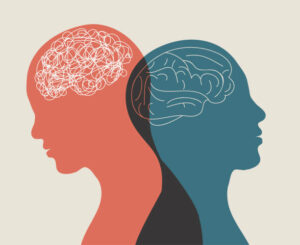
Bipolar disorder and Borderline personality disorder are mental health conditions, with distinct differences and some similarities. Here’s a comparison between the two to help further understand the uniqueness of both:
- Nature of the Disorders:
- Bipolar Disorder: It is a mood disorder characterized by extreme shifts in mood, energy levels, and activity levels. These mood swings typically alternate between episodes of depression and mania/hypomania.
- Borderline Personality Disorder: is characterized by unstable moods, behavior, and relationships. Individuals with borderline personality disorder may experience intense emotions and difficulty regulating them. This can further result in impulsiveness and unstable self-image.
- Mood Symptoms:
-
- Bipolar Disorder: Mood episodes in bipolar disorder are distinct and last for a specific period. Depressive episodes are marked by sadness, loss of interest, and fatigue. Manic episodes involve elevated or irritable mood, increased energy, racing thoughts, and impulsive behavior.
- Borderline Personality Disorder: Experiences of intense and rapidly shifting mood swings have been evidenced. They may have feelings of emptiness, difficulties managing moods and exhibit emotional instability, leading to self-destructive behaviors or self-harm.
- Duration of Symptoms:
-
- Bipolar Disorder: Mood episodes in bipolar disorder can last for days, weeks, or even months. In between episodes, individuals generally experience a stable mood.
- Borderline Personality Disorder: Emotional instability, impulsivity, and mood swings in borderline personality disorder are more persistent and can occur throughout the day over an extended period.
- Relationship Patterns:
-
- Bipolar Disorder: While relationships can be affected during mood episodes, they are not typically a defining feature of bipolar disorder. However, interpersonal difficulties can arise due to the impact of mood swings on behavior and communication.
- Borderline Personality Disorder: Individuals with borderline personality disorder often struggle with unstable and intense relationships. They may fear abandonment, have difficulties with trust, and exhibit patterns of idealization and devaluation in their relationships.
- Treatment Approaches:
-
- Bipolar Disorder: Treatment for bipolar disorder generally involves a combination of medication (mood stabilizers, antipsychotics, etc.) and psychotherapy (such as cognitive-behavioral therapy or interpersonal therapy) to manage mood episodes and stabilize mood patterns.
- Borderline Personality Disorder: Psychotherapy is the primary treatment for borderline personality disorder. Dialectical behavior therapy (DBT), schema-focused therapy, and psychodynamic therapy are commonly used to address emotional dysregulation, self-destructive behaviors, and relationship difficulties.
